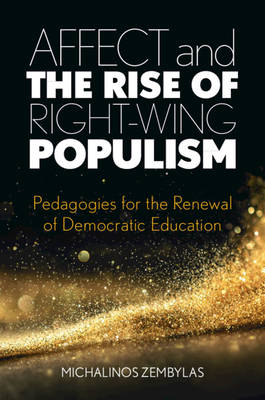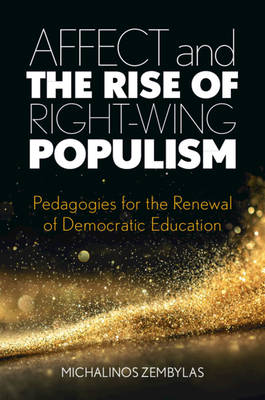
- Afhalen na 1 uur in een winkel met voorraad
- Gratis thuislevering in België vanaf € 30
- Ruim aanbod met 7 miljoen producten
- Afhalen na 1 uur in een winkel met voorraad
- Gratis thuislevering in België vanaf € 30
- Ruim aanbod met 7 miljoen producten
Zoeken
Affect and the Rise of Right-Wing Populism
Pedagogies for the Renewal of Democratic Education
Michalinos Zembylas
Paperback | Engels
€ 64,95
+ 129 punten
Uitvoering
Omschrijving
This book uses affect theory to analyze the rise of right-wing populism in recent years and discusses the pedagogical implications for democratic education. It provides examples of how affect and emotion play a crucial role in the rise and reproduction of current right-wing populism. The author suggests ideas about affective pedagogies for educators to use (along with recognizing the risks involved) to renew democratic education. The chapters lay out the importance of harnessing the power of affective experiences and adopting strategic pedagogical approaches to provide affirmative practices that move beyond simply criticizing right-wing populism. The book consequently undermines the power of fascist and right-wing tendencies in public life and educational settings without stooping to methods of indoctrination. This volume is a valuable resource for researchers and policy-makers in education, political science and other related fields, who can utilize the affective complexities involved in combatting right-wing populism to their advantage.
Specificaties
Betrokkenen
- Auteur(s):
- Uitgeverij:
Inhoud
- Aantal bladzijden:
- 260
- Taal:
- Engels
Eigenschappen
- Productcode (EAN):
- 9781108978897
- Verschijningsdatum:
- 6/05/2021
- Uitvoering:
- Paperback
- Formaat:
- Trade paperback (VS)
- Afmetingen:
- 152 mm x 229 mm
- Gewicht:
- 353 g

Alleen bij Standaard Boekhandel
+ 129 punten op je klantenkaart van Standaard Boekhandel
Beoordelingen
We publiceren alleen reviews die voldoen aan de voorwaarden voor reviews. Bekijk onze voorwaarden voor reviews.








